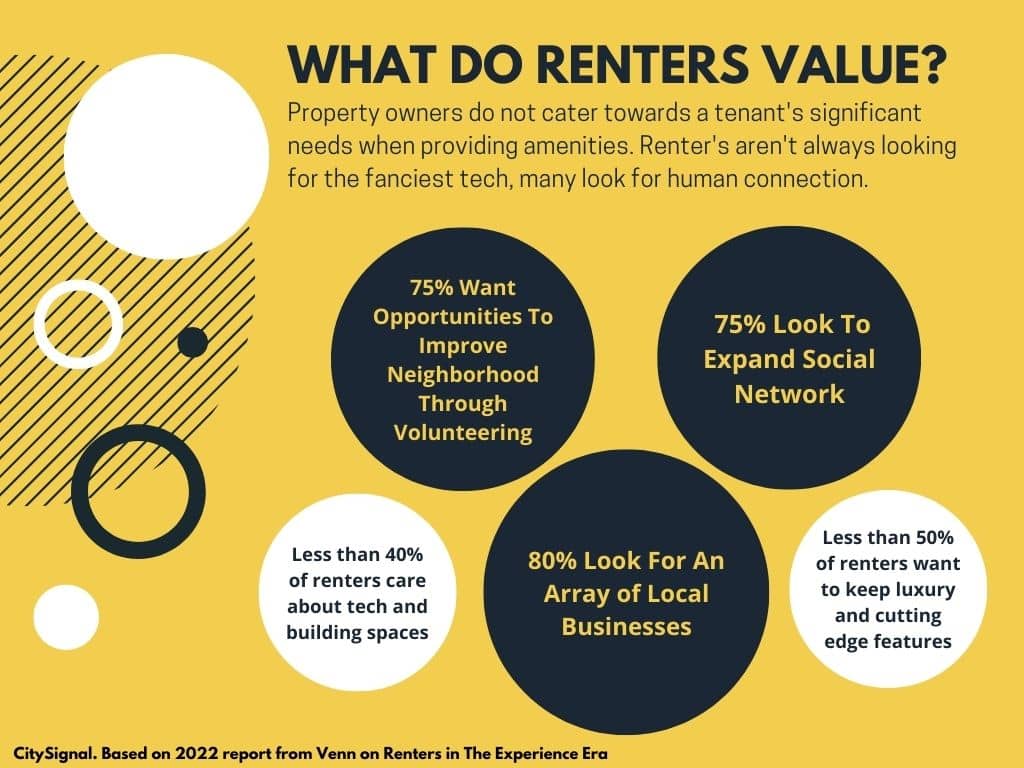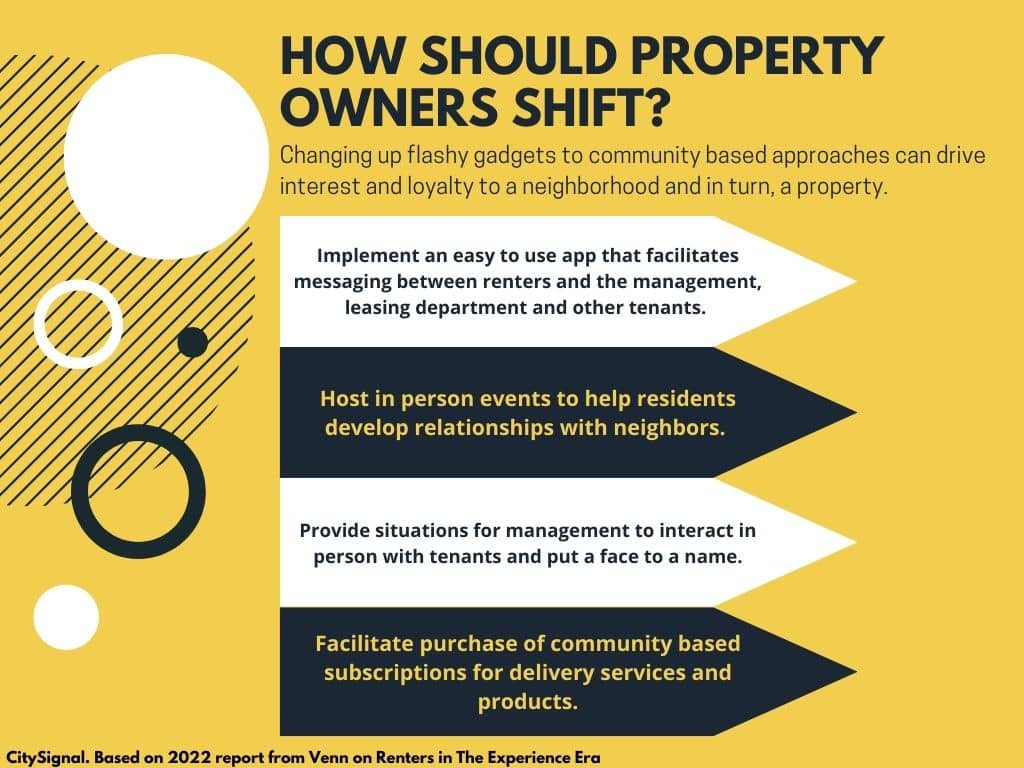At the end of their lease term, renters sometimes face the difficult decision of whether they want to renew their lease or move elsewhere. A new study from Venn, the world’s leading resident experience company, suggests that current renters are more inclined to renew their leases when they feel connected to their neighbors and community. The study surveyed more than 1,500 renters in multi-family apartment buildings across the United States (including NYC), asked participants about their renting preferences and habits, and then provided recommendations to property owners who wish to adapt to current tenant needs.
This shift in renter behavior contributes to what Venn identifies as “The Experience Era,” where customers are willing to pay more for a more pleasant consumer experience. Venn recommends property owners who want to improve tenant experiences and retention focus on implementing neighborhood-based amenities and features to connect tenants with their community. Between messaging portals, social events, and local small business subscription services, property owners can embrace The Experience Era to create better renter experiences.
What is The Experience Era?
Customers consider their overall experience when selecting which product to use in their day-to-day life. Consumers often opt for a product geared toward convenience and connection between industries, entertainment, transportation, and health and fitness. This desire influences purchase behavior, as customers value the experience of using the product as much as the product itself, contributing to The Experience Era.
Venn points to several innovative products that have already successfully captured this type of consumer. Companies like Lyft and Netflix offer the same product to customers like taxis and cable television but focus on easing the experience of consuming that product. When a customer hails their car, handles payment, and communicates with the support team all through an app on their phone, they have a more direct experience and will likely continue to use that service in the future.
The Experience Era also focuses on communication and connection, where consumers feel a sense of community. Fitness-based companies use online classes and programming to capture this audience and allow users to feel connected to those with similar interests. Outside fitness, consumers go to online groups, threads, and message portals to join communities and share their ideas.

While many companies have created products to target customers purchasing in The Experience Era, one industry remains significantly neglected – real estate. Venn’s study suggests that property owners currently do not cater toward this experience-based purchasing behavior and can make changes that benefit themselves, their tenants, and their community.
What have property owners been doing?
Over the past decade, property owners implemented tech-based products and luxury communal areas for their tenants to satisfy their wants and needs effectively. While items like keyless entry and communal spaces like movie theaters may appeal to some residents, they remain vastly underutilized. Landlords commonly miss the mark when appealing to their renters, trying to find quick-fix solutions that immediately fix a particular problem in the building.
According to Venn, many landlords do not financially interact with their tenants beyond collecting monthly rent payments. Most do not offer tenants the ability to pay for add-on services or features. Typically, tenants pay for building amenities through rent and do not make additional monthly payments.
What do current renters value?
Venn suggests that property owners do not cater to a tenant’s significant needs and desires. Less than half of the surveyed renters with access to technology-based amenities and common spaces found those features necessary when deciding whether or not to renew their lease. More than half of renters with access to unique amenities and technology do not heavily consider those factors in their decision-making process.
What do renters value then? Over 80% report that they want to live in a neighborhood with a thriving array of local businesses, and around 75% claim that they want to expand their social network and know their neighbors. Additionally, 75% look for opportunities to improve their neighborhood through volunteer work.
These statistics suggest that renters in The Experience Era crave easy access to a connected community. Yet many renters do not know their neighbors, limiting their local interaction and level of satisfaction with their neighborhood. Less than 40% of renters feel they belong in their community.
How does The Experience Era impact moving behavior?
When asked to identify factors that contribute to their likelihood of renewing their leases, 57% of participants identified one of the three following neighborhood-based contributors:
- Friends, neighbors, and acquaintances in my neighborhood
- The local businesses in the neighborhood they regularly shop at
- The sense of belonging they feel in my neighborhood
Furthermore, renters with more than five close relationships in their neighborhood are one and a half times more likely to renew their leases. Tenants crave strong connections to their neighbors and community and are likely to continue living in the same unit as long as they feel that connection. Without a community and sense of belonging, renters will take their business elsewhere and move to a different neighborhood.
What can property owners do to cater to neighborhood-focused renters?
To better keep their tenants happy and renew their leases, property owners should shift away from luxurious gadgets and common areas, instead refocusing their resources toward experiences that connect their tenants to their community. Venn suggests that while landlords can still use technology to implement new features, they should use it to communicate with community members instead of just opening a front door. They, therefore, recommend property owners consider the following possibilities when considering how to foster a sense of community between tenants and their neighborhood.
Messaging portal
Residents who can easily connect with community members and submit maintenance requests are more likely to renew their leases. By combining both sides of The Experience Era, ease and connection, into one cohesive app, landlords can retain their tenants and provide them the opportunity to communicate their wants and needs efficiently.
Renters who can communicate with other tenants in their building or community are more likely to develop close relationships, contributing to the five close relationships the average tenant needs to stay in their area. Messaging portals and apps also allow tenants to submit maintenance requests, contact leasing departments, and easily ask for support as needed. Tenants who can easily reach out for help will likely have a better experience and therefore find the motivation to stay in their unit.
The prospective financial gain may inspire property owners who are not motivated to connect their tenants with each other. Nearly two-thirds of survey participants are ready to pay an additional fee for services that connect them to their community.
In-person events
In a world driven by technology and digital connection, landlords can revisit in-person opportunities for social connection to help tenants develop friendships with their neighbors. Landlords can even attend community events to connect with their tenants and put a face to the name on a lease agreement. Renters who feel they have opportunities to develop friendships in their neighborhood are more than twice as likely to renew their lease than tenants who feel differently.
One spot for community-based subscriptions
The average American renter spends hundreds of dollars monthly on grocery delivery, fitness and wellness services, and utilities. Between 63% and 82% of survey participants report wanting access to these services, with varying levels of interest based on the product. Therefore, property owners can best cater to their tenant’s needs by connecting them with local businesses that provide these kinds of services.
Property owners can utilize technology to easily create neighborhood guides that renters can access to purchase subscription-based services and products conveniently. Keeping all businesses in the same app or website will make it simple for tenants to browse and buy all their desired products in one sitting, simplifying the purchasing process and connecting them to the businesses in their neighborhood.
Connecting renters to local businesses will satisfy their desire to interact with their local community while investing money into those businesses and helping them stay in the neighborhood. Furthermore, these subscription programs will also encourage community members to start their small businesses, as they could immediately directly sell to their neighbors and reduce their barrier to entry.
Conclusion
Venn’s recent study states that 1,500 American renters are more likely to renew their leases when they feel connected to and valued by their community. While property owners recently switched to implementing lush communal areas and technology-based apps to cater to tenants, these measures did not drastically impact a renter’s decision to stay in the building.
Using technology and promoting social engagement, property owners can increase tenant renewal rates by connecting their residents through messaging portals and social events. They can further connect their building to the rest of their community through generating programs and websites that highlight local businesses and allow tenants to purchase products and subscriptions in one convenient place.




